Deva is the hindu term Stock Photos and Images
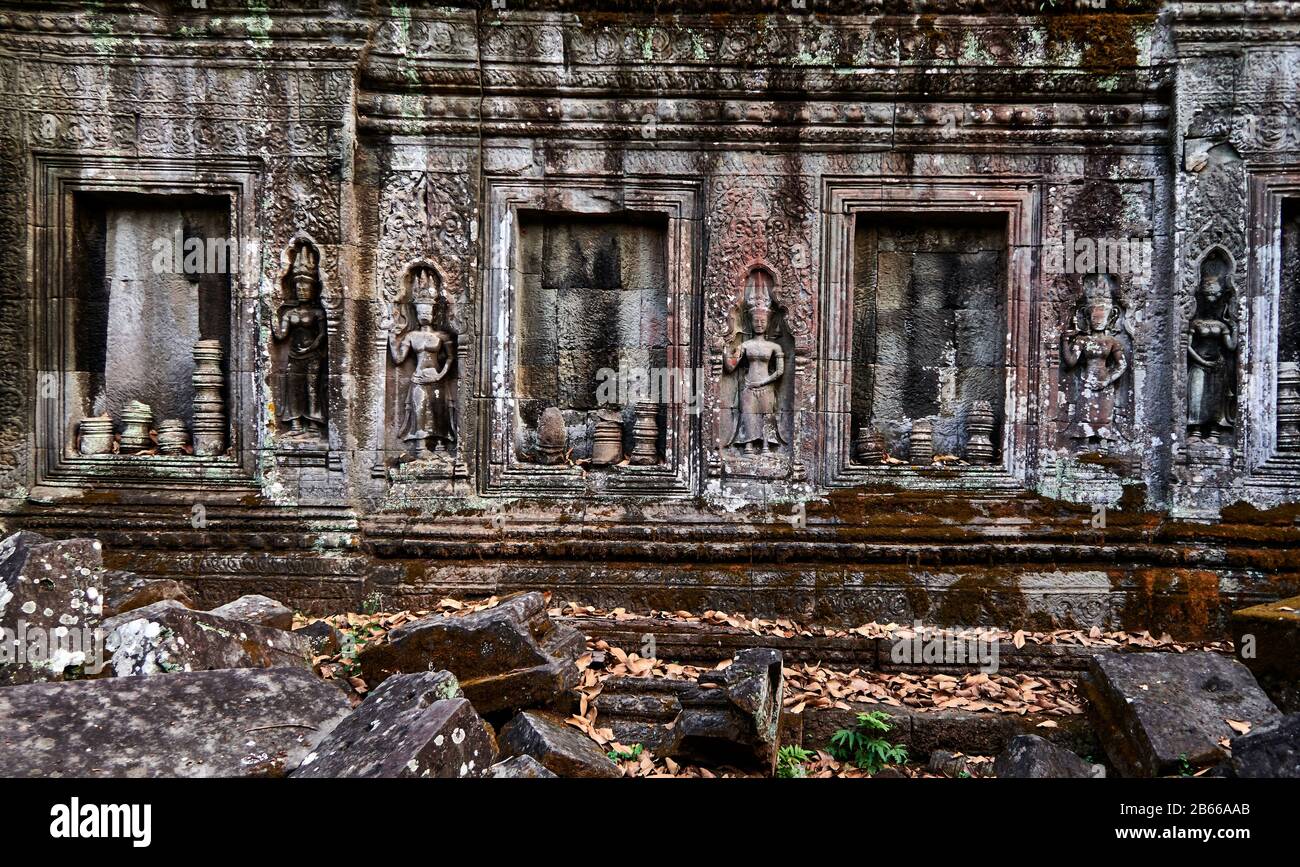 Cambodia-Angkor Ta ProhmSandstone sculpture of Apsara Devata. An Apsara or Apsarasa is a female spirit of the clouds and waters in Hindu and Buddhist mythology. Deva is the Hindu term for deity, devatas are a kind of smaller more focused devas Stock Photohttps://www.alamy.com/image-license-details/?v=1https://www.alamy.com/cambodia-angkor-ta-prohmsandstone-sculpture-of-apsara-devata-an-apsara-or-apsarasa-is-a-female-spirit-of-the-clouds-and-waters-in-hindu-and-buddhist-mythology-deva-is-the-hindu-term-for-deity-devatas-are-a-kind-of-smaller-more-focused-devas-image348035139.html
Cambodia-Angkor Ta ProhmSandstone sculpture of Apsara Devata. An Apsara or Apsarasa is a female spirit of the clouds and waters in Hindu and Buddhist mythology. Deva is the Hindu term for deity, devatas are a kind of smaller more focused devas Stock Photohttps://www.alamy.com/image-license-details/?v=1https://www.alamy.com/cambodia-angkor-ta-prohmsandstone-sculpture-of-apsara-devata-an-apsara-or-apsarasa-is-a-female-spirit-of-the-clouds-and-waters-in-hindu-and-buddhist-mythology-deva-is-the-hindu-term-for-deity-devatas-are-a-kind-of-smaller-more-focused-devas-image348035139.htmlRM2B66AAB–Cambodia-Angkor Ta ProhmSandstone sculpture of Apsara Devata. An Apsara or Apsarasa is a female spirit of the clouds and waters in Hindu and Buddhist mythology. Deva is the Hindu term for deity, devatas are a kind of smaller more focused devas
 Thailand: Sculpture of a thewada (angel), Wat Nantaram, Chiang Mai. Deva is the Hindu term for deity; devatas (Thai: thewada) are a kind of smaller more focused devas, the equivalent of guardian spirits or guardian angels. There are male and female devata. In Hinduism, the devatas that guard the nine cardinal points are called Devata Lokapala (Guardians of the Directions) or in ancient Java called Dewata Nawa Sanga (Nine guardian gods). Each caste has its guardian deva, and every human activity has its devata, its spiritual counterpart or aspect. Stock Photohttps://www.alamy.com/image-license-details/?v=1https://www.alamy.com/thailand-sculpture-of-a-thewada-angel-wat-nantaram-chiang-mai-deva-is-the-hindu-term-for-deity-devatas-thai-thewada-are-a-kind-of-smaller-more-focused-devas-the-equivalent-of-guardian-spirits-or-guardian-angels-there-are-male-and-female-devata-in-hinduism-the-devatas-that-guard-the-nine-cardinal-points-are-called-devata-lokapala-guardians-of-the-directions-or-in-ancient-java-called-dewata-nawa-sanga-nine-guardian-gods-each-caste-has-its-guardian-deva-and-every-human-activity-has-its-devata-its-spiritual-counterpart-or-aspect-image344242846.html
Thailand: Sculpture of a thewada (angel), Wat Nantaram, Chiang Mai. Deva is the Hindu term for deity; devatas (Thai: thewada) are a kind of smaller more focused devas, the equivalent of guardian spirits or guardian angels. There are male and female devata. In Hinduism, the devatas that guard the nine cardinal points are called Devata Lokapala (Guardians of the Directions) or in ancient Java called Dewata Nawa Sanga (Nine guardian gods). Each caste has its guardian deva, and every human activity has its devata, its spiritual counterpart or aspect. Stock Photohttps://www.alamy.com/image-license-details/?v=1https://www.alamy.com/thailand-sculpture-of-a-thewada-angel-wat-nantaram-chiang-mai-deva-is-the-hindu-term-for-deity-devatas-thai-thewada-are-a-kind-of-smaller-more-focused-devas-the-equivalent-of-guardian-spirits-or-guardian-angels-there-are-male-and-female-devata-in-hinduism-the-devatas-that-guard-the-nine-cardinal-points-are-called-devata-lokapala-guardians-of-the-directions-or-in-ancient-java-called-dewata-nawa-sanga-nine-guardian-gods-each-caste-has-its-guardian-deva-and-every-human-activity-has-its-devata-its-spiritual-counterpart-or-aspect-image344242846.htmlRM2B01H7A–Thailand: Sculpture of a thewada (angel), Wat Nantaram, Chiang Mai. Deva is the Hindu term for deity; devatas (Thai: thewada) are a kind of smaller more focused devas, the equivalent of guardian spirits or guardian angels. There are male and female devata. In Hinduism, the devatas that guard the nine cardinal points are called Devata Lokapala (Guardians of the Directions) or in ancient Java called Dewata Nawa Sanga (Nine guardian gods). Each caste has its guardian deva, and every human activity has its devata, its spiritual counterpart or aspect.
 Deva is the Hindu term for deity; devatas (Thai: thewada) are a kind of smaller more focused devas, the equivalent of guardian spirits or guardian angels. There are male and female devata. In Hinduism, the devatas that guard the nine cardinal points are called Devata Lokapala (Guardians of the Directions) or in ancient Java called Dewata Nawa Sanga (Nine guardian gods). Each caste has its guardian deva, and every human activity has its devata, its spiritual counterpart or aspect. The historic town of Chiang Saen, situated on the west bank of the Mekong River opposite Laos, dates from the 12th Stock Photohttps://www.alamy.com/image-license-details/?v=1https://www.alamy.com/deva-is-the-hindu-term-for-deity-devatas-thai-thewada-are-a-kind-of-smaller-more-focused-devas-the-equivalent-of-guardian-spirits-or-guardian-angels-there-are-male-and-female-devata-in-hinduism-the-devatas-that-guard-the-nine-cardinal-points-are-called-devata-lokapala-guardians-of-the-directions-or-in-ancient-java-called-dewata-nawa-sanga-nine-guardian-gods-each-caste-has-its-guardian-deva-and-every-human-activity-has-its-devata-its-spiritual-counterpart-or-aspect-the-historic-town-of-chiang-saen-situated-on-the-west-bank-of-the-mekong-river-opposite-laos-dates-from-the-12th-image344257783.html
Deva is the Hindu term for deity; devatas (Thai: thewada) are a kind of smaller more focused devas, the equivalent of guardian spirits or guardian angels. There are male and female devata. In Hinduism, the devatas that guard the nine cardinal points are called Devata Lokapala (Guardians of the Directions) or in ancient Java called Dewata Nawa Sanga (Nine guardian gods). Each caste has its guardian deva, and every human activity has its devata, its spiritual counterpart or aspect. The historic town of Chiang Saen, situated on the west bank of the Mekong River opposite Laos, dates from the 12th Stock Photohttps://www.alamy.com/image-license-details/?v=1https://www.alamy.com/deva-is-the-hindu-term-for-deity-devatas-thai-thewada-are-a-kind-of-smaller-more-focused-devas-the-equivalent-of-guardian-spirits-or-guardian-angels-there-are-male-and-female-devata-in-hinduism-the-devatas-that-guard-the-nine-cardinal-points-are-called-devata-lokapala-guardians-of-the-directions-or-in-ancient-java-called-dewata-nawa-sanga-nine-guardian-gods-each-caste-has-its-guardian-deva-and-every-human-activity-has-its-devata-its-spiritual-counterpart-or-aspect-the-historic-town-of-chiang-saen-situated-on-the-west-bank-of-the-mekong-river-opposite-laos-dates-from-the-12th-image344257783.htmlRM2B0288R–Deva is the Hindu term for deity; devatas (Thai: thewada) are a kind of smaller more focused devas, the equivalent of guardian spirits or guardian angels. There are male and female devata. In Hinduism, the devatas that guard the nine cardinal points are called Devata Lokapala (Guardians of the Directions) or in ancient Java called Dewata Nawa Sanga (Nine guardian gods). Each caste has its guardian deva, and every human activity has its devata, its spiritual counterpart or aspect. The historic town of Chiang Saen, situated on the west bank of the Mekong River opposite Laos, dates from the 12th
 Deva is the Hindu term for deity; devatas (Thai: thewada) are a kind of smaller more focused devas, the equivalent of guardian spirits or guardian angels. There are male and female devata. In Hinduism, the devatas that guard the nine cardinal points are called Devata Lokapala (Guardians of the Directions) or in ancient Java called Dewata Nawa Sanga (Nine guardian gods). Each caste has its guardian deva, and every human activity has its devata, its spiritual counterpart or aspect. Abandoned in the late 13th century CE, and now in ruins, Wiang Kum Kam was once the capital of Thailand’s northern Stock Photohttps://www.alamy.com/image-license-details/?v=1https://www.alamy.com/deva-is-the-hindu-term-for-deity-devatas-thai-thewada-are-a-kind-of-smaller-more-focused-devas-the-equivalent-of-guardian-spirits-or-guardian-angels-there-are-male-and-female-devata-in-hinduism-the-devatas-that-guard-the-nine-cardinal-points-are-called-devata-lokapala-guardians-of-the-directions-or-in-ancient-java-called-dewata-nawa-sanga-nine-guardian-gods-each-caste-has-its-guardian-deva-and-every-human-activity-has-its-devata-its-spiritual-counterpart-or-aspect-abandoned-in-the-late-13th-century-ce-and-now-in-ruins-wiang-kum-kam-was-once-the-capital-of-thailands-northern-image344259575.html
Deva is the Hindu term for deity; devatas (Thai: thewada) are a kind of smaller more focused devas, the equivalent of guardian spirits or guardian angels. There are male and female devata. In Hinduism, the devatas that guard the nine cardinal points are called Devata Lokapala (Guardians of the Directions) or in ancient Java called Dewata Nawa Sanga (Nine guardian gods). Each caste has its guardian deva, and every human activity has its devata, its spiritual counterpart or aspect. Abandoned in the late 13th century CE, and now in ruins, Wiang Kum Kam was once the capital of Thailand’s northern Stock Photohttps://www.alamy.com/image-license-details/?v=1https://www.alamy.com/deva-is-the-hindu-term-for-deity-devatas-thai-thewada-are-a-kind-of-smaller-more-focused-devas-the-equivalent-of-guardian-spirits-or-guardian-angels-there-are-male-and-female-devata-in-hinduism-the-devatas-that-guard-the-nine-cardinal-points-are-called-devata-lokapala-guardians-of-the-directions-or-in-ancient-java-called-dewata-nawa-sanga-nine-guardian-gods-each-caste-has-its-guardian-deva-and-every-human-activity-has-its-devata-its-spiritual-counterpart-or-aspect-abandoned-in-the-late-13th-century-ce-and-now-in-ruins-wiang-kum-kam-was-once-the-capital-of-thailands-northern-image344259575.htmlRM2B02AGR–Deva is the Hindu term for deity; devatas (Thai: thewada) are a kind of smaller more focused devas, the equivalent of guardian spirits or guardian angels. There are male and female devata. In Hinduism, the devatas that guard the nine cardinal points are called Devata Lokapala (Guardians of the Directions) or in ancient Java called Dewata Nawa Sanga (Nine guardian gods). Each caste has its guardian deva, and every human activity has its devata, its spiritual counterpart or aspect. Abandoned in the late 13th century CE, and now in ruins, Wiang Kum Kam was once the capital of Thailand’s northern
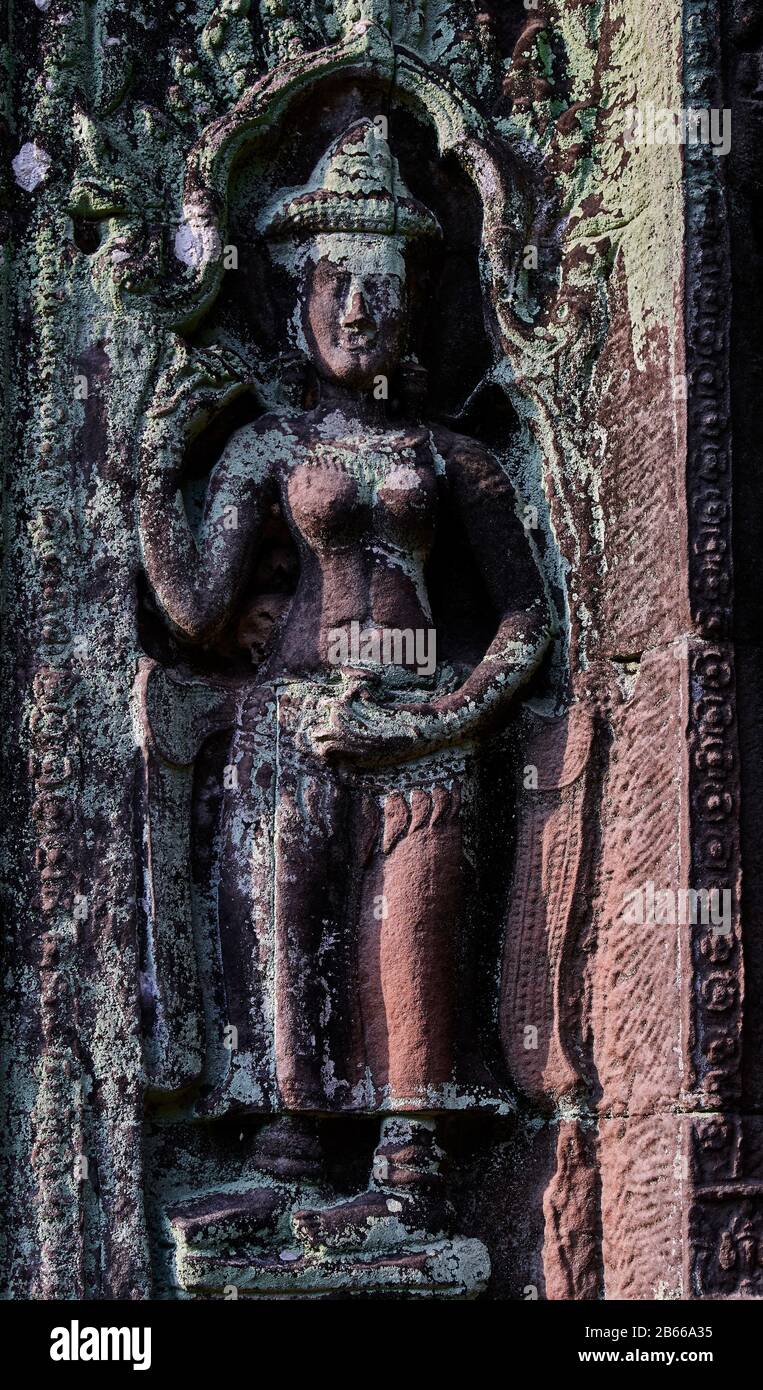 Cambodia-Angkor Ta ProhmSandstone sculpture of Apsara Devata. An Apsara or Apsarasa is a female spirit of the clouds and waters in Hindu and Buddhist mythology. Deva is the Hindu term for deity, devatas are a kind of smaller more focused devas Stock Photohttps://www.alamy.com/image-license-details/?v=1https://www.alamy.com/cambodia-angkor-ta-prohmsandstone-sculpture-of-apsara-devata-an-apsara-or-apsarasa-is-a-female-spirit-of-the-clouds-and-waters-in-hindu-and-buddhist-mythology-deva-is-the-hindu-term-for-deity-devatas-are-a-kind-of-smaller-more-focused-devas-image348034937.html
Cambodia-Angkor Ta ProhmSandstone sculpture of Apsara Devata. An Apsara or Apsarasa is a female spirit of the clouds and waters in Hindu and Buddhist mythology. Deva is the Hindu term for deity, devatas are a kind of smaller more focused devas Stock Photohttps://www.alamy.com/image-license-details/?v=1https://www.alamy.com/cambodia-angkor-ta-prohmsandstone-sculpture-of-apsara-devata-an-apsara-or-apsarasa-is-a-female-spirit-of-the-clouds-and-waters-in-hindu-and-buddhist-mythology-deva-is-the-hindu-term-for-deity-devatas-are-a-kind-of-smaller-more-focused-devas-image348034937.htmlRM2B66A35–Cambodia-Angkor Ta ProhmSandstone sculpture of Apsara Devata. An Apsara or Apsarasa is a female spirit of the clouds and waters in Hindu and Buddhist mythology. Deva is the Hindu term for deity, devatas are a kind of smaller more focused devas
 Deva is the Hindu term for deity; devatas (Thai: thewada) are a kind of smaller more focused devas, the equivalent of guardian spirits or guardian angels. There are male and female devata. In Hinduism, the devatas that guard the nine cardinal points are called Devata Lokapala (Guardians of the Directions) or in ancient Java called Dewata Nawa Sanga (Nine guardian gods). Each caste has its guardian deva, and every human activity has its devata, its spiritual counterpart or aspect. Abandoned in the late 13th century CE, and now in ruins, Wiang Kum Kam was once the capital of Thailand’s northern Stock Photohttps://www.alamy.com/image-license-details/?v=1https://www.alamy.com/deva-is-the-hindu-term-for-deity-devatas-thai-thewada-are-a-kind-of-smaller-more-focused-devas-the-equivalent-of-guardian-spirits-or-guardian-angels-there-are-male-and-female-devata-in-hinduism-the-devatas-that-guard-the-nine-cardinal-points-are-called-devata-lokapala-guardians-of-the-directions-or-in-ancient-java-called-dewata-nawa-sanga-nine-guardian-gods-each-caste-has-its-guardian-deva-and-every-human-activity-has-its-devata-its-spiritual-counterpart-or-aspect-abandoned-in-the-late-13th-century-ce-and-now-in-ruins-wiang-kum-kam-was-once-the-capital-of-thailands-northern-image344259571.html
Deva is the Hindu term for deity; devatas (Thai: thewada) are a kind of smaller more focused devas, the equivalent of guardian spirits or guardian angels. There are male and female devata. In Hinduism, the devatas that guard the nine cardinal points are called Devata Lokapala (Guardians of the Directions) or in ancient Java called Dewata Nawa Sanga (Nine guardian gods). Each caste has its guardian deva, and every human activity has its devata, its spiritual counterpart or aspect. Abandoned in the late 13th century CE, and now in ruins, Wiang Kum Kam was once the capital of Thailand’s northern Stock Photohttps://www.alamy.com/image-license-details/?v=1https://www.alamy.com/deva-is-the-hindu-term-for-deity-devatas-thai-thewada-are-a-kind-of-smaller-more-focused-devas-the-equivalent-of-guardian-spirits-or-guardian-angels-there-are-male-and-female-devata-in-hinduism-the-devatas-that-guard-the-nine-cardinal-points-are-called-devata-lokapala-guardians-of-the-directions-or-in-ancient-java-called-dewata-nawa-sanga-nine-guardian-gods-each-caste-has-its-guardian-deva-and-every-human-activity-has-its-devata-its-spiritual-counterpart-or-aspect-abandoned-in-the-late-13th-century-ce-and-now-in-ruins-wiang-kum-kam-was-once-the-capital-of-thailands-northern-image344259571.htmlRM2B02AGK–Deva is the Hindu term for deity; devatas (Thai: thewada) are a kind of smaller more focused devas, the equivalent of guardian spirits or guardian angels. There are male and female devata. In Hinduism, the devatas that guard the nine cardinal points are called Devata Lokapala (Guardians of the Directions) or in ancient Java called Dewata Nawa Sanga (Nine guardian gods). Each caste has its guardian deva, and every human activity has its devata, its spiritual counterpart or aspect. Abandoned in the late 13th century CE, and now in ruins, Wiang Kum Kam was once the capital of Thailand’s northern
 Thailand: Sculpture of a thewada (angels), Wat Nantaram, Chiang Mai. Deva is the Hindu term for deity; devatas (Thai: thewada) are a kind of smaller more focused devas, the equivalent of guardian spirits or guardian angels. There are male and female devata. In Hinduism, the devatas that guard the nine cardinal points are called Devata Lokapala (Guardians of the Directions) or in ancient Java called Dewata Nawa Sanga (Nine guardian gods). Each caste has its guardian deva, and every human activity has its devata, its spiritual counterpart or aspect. Stock Photohttps://www.alamy.com/image-license-details/?v=1https://www.alamy.com/thailand-sculpture-of-a-thewada-angels-wat-nantaram-chiang-mai-deva-is-the-hindu-term-for-deity-devatas-thai-thewada-are-a-kind-of-smaller-more-focused-devas-the-equivalent-of-guardian-spirits-or-guardian-angels-there-are-male-and-female-devata-in-hinduism-the-devatas-that-guard-the-nine-cardinal-points-are-called-devata-lokapala-guardians-of-the-directions-or-in-ancient-java-called-dewata-nawa-sanga-nine-guardian-gods-each-caste-has-its-guardian-deva-and-every-human-activity-has-its-devata-its-spiritual-counterpart-or-aspect-image344242874.html
Thailand: Sculpture of a thewada (angels), Wat Nantaram, Chiang Mai. Deva is the Hindu term for deity; devatas (Thai: thewada) are a kind of smaller more focused devas, the equivalent of guardian spirits or guardian angels. There are male and female devata. In Hinduism, the devatas that guard the nine cardinal points are called Devata Lokapala (Guardians of the Directions) or in ancient Java called Dewata Nawa Sanga (Nine guardian gods). Each caste has its guardian deva, and every human activity has its devata, its spiritual counterpart or aspect. Stock Photohttps://www.alamy.com/image-license-details/?v=1https://www.alamy.com/thailand-sculpture-of-a-thewada-angels-wat-nantaram-chiang-mai-deva-is-the-hindu-term-for-deity-devatas-thai-thewada-are-a-kind-of-smaller-more-focused-devas-the-equivalent-of-guardian-spirits-or-guardian-angels-there-are-male-and-female-devata-in-hinduism-the-devatas-that-guard-the-nine-cardinal-points-are-called-devata-lokapala-guardians-of-the-directions-or-in-ancient-java-called-dewata-nawa-sanga-nine-guardian-gods-each-caste-has-its-guardian-deva-and-every-human-activity-has-its-devata-its-spiritual-counterpart-or-aspect-image344242874.htmlRM2B01H8A–Thailand: Sculpture of a thewada (angels), Wat Nantaram, Chiang Mai. Deva is the Hindu term for deity; devatas (Thai: thewada) are a kind of smaller more focused devas, the equivalent of guardian spirits or guardian angels. There are male and female devata. In Hinduism, the devatas that guard the nine cardinal points are called Devata Lokapala (Guardians of the Directions) or in ancient Java called Dewata Nawa Sanga (Nine guardian gods). Each caste has its guardian deva, and every human activity has its devata, its spiritual counterpart or aspect.
 Deva is the Hindu term for deity; devatas (Thai: thewada) are a kind of smaller more focused devas, the equivalent of guardian spirits or guardian angels. There are male and female devata. In Hinduism, the devatas that guard the nine cardinal points are called Devata Lokapala (Guardians of the Directions) or in ancient Java called Dewata Nawa Sanga (Nine guardian gods). Each caste has its guardian deva, and every human activity has its devata, its spiritual counterpart or aspect. The Buddhist temple of Wat Chet Yot (Jet Yod) was constructed in 1455 CE by King Tilokarat in the style of the Mah Stock Photohttps://www.alamy.com/image-license-details/?v=1https://www.alamy.com/deva-is-the-hindu-term-for-deity-devatas-thai-thewada-are-a-kind-of-smaller-more-focused-devas-the-equivalent-of-guardian-spirits-or-guardian-angels-there-are-male-and-female-devata-in-hinduism-the-devatas-that-guard-the-nine-cardinal-points-are-called-devata-lokapala-guardians-of-the-directions-or-in-ancient-java-called-dewata-nawa-sanga-nine-guardian-gods-each-caste-has-its-guardian-deva-and-every-human-activity-has-its-devata-its-spiritual-counterpart-or-aspect-the-buddhist-temple-of-wat-chet-yot-jet-yod-was-constructed-in-1455-ce-by-king-tilokarat-in-the-style-of-the-mah-image344257117.html
Deva is the Hindu term for deity; devatas (Thai: thewada) are a kind of smaller more focused devas, the equivalent of guardian spirits or guardian angels. There are male and female devata. In Hinduism, the devatas that guard the nine cardinal points are called Devata Lokapala (Guardians of the Directions) or in ancient Java called Dewata Nawa Sanga (Nine guardian gods). Each caste has its guardian deva, and every human activity has its devata, its spiritual counterpart or aspect. The Buddhist temple of Wat Chet Yot (Jet Yod) was constructed in 1455 CE by King Tilokarat in the style of the Mah Stock Photohttps://www.alamy.com/image-license-details/?v=1https://www.alamy.com/deva-is-the-hindu-term-for-deity-devatas-thai-thewada-are-a-kind-of-smaller-more-focused-devas-the-equivalent-of-guardian-spirits-or-guardian-angels-there-are-male-and-female-devata-in-hinduism-the-devatas-that-guard-the-nine-cardinal-points-are-called-devata-lokapala-guardians-of-the-directions-or-in-ancient-java-called-dewata-nawa-sanga-nine-guardian-gods-each-caste-has-its-guardian-deva-and-every-human-activity-has-its-devata-its-spiritual-counterpart-or-aspect-the-buddhist-temple-of-wat-chet-yot-jet-yod-was-constructed-in-1455-ce-by-king-tilokarat-in-the-style-of-the-mah-image344257117.htmlRM2B027D1–Deva is the Hindu term for deity; devatas (Thai: thewada) are a kind of smaller more focused devas, the equivalent of guardian spirits or guardian angels. There are male and female devata. In Hinduism, the devatas that guard the nine cardinal points are called Devata Lokapala (Guardians of the Directions) or in ancient Java called Dewata Nawa Sanga (Nine guardian gods). Each caste has its guardian deva, and every human activity has its devata, its spiritual counterpart or aspect. The Buddhist temple of Wat Chet Yot (Jet Yod) was constructed in 1455 CE by King Tilokarat in the style of the Mah
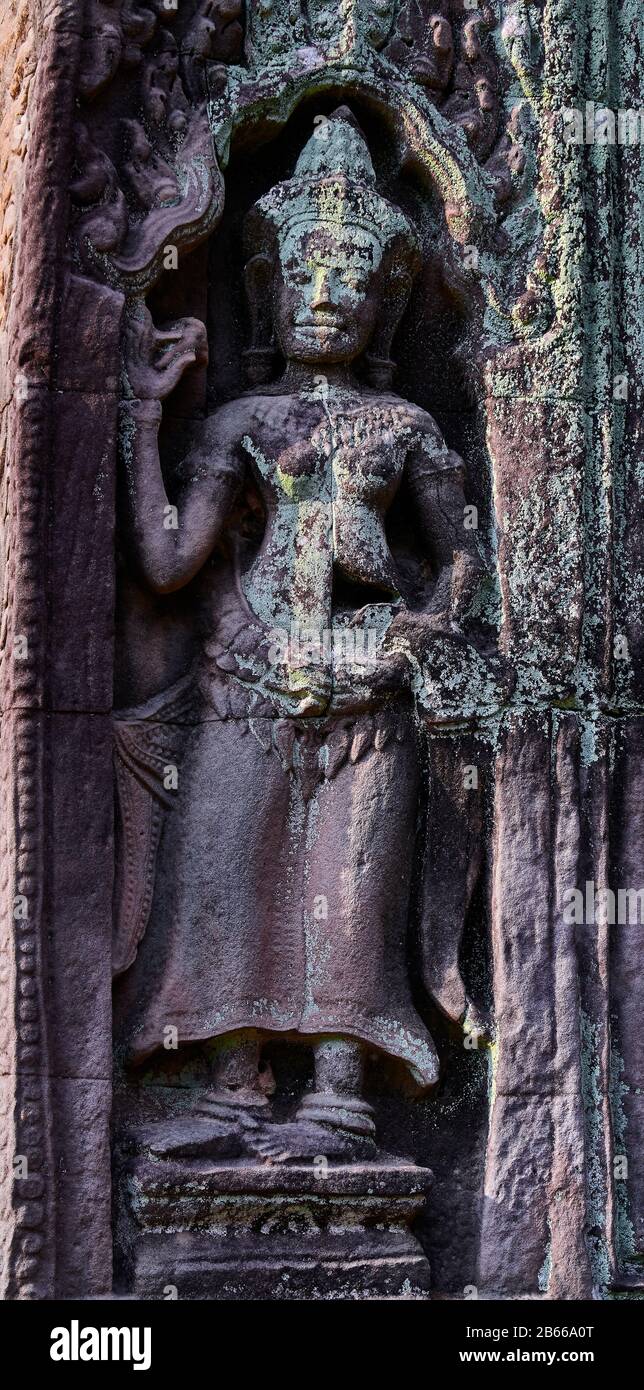 Cambodia-Angkor Ta ProhmSandstone sculpture of Apsara Devata. An Apsara or Apsarasa is a female spirit of the clouds and waters in Hindu and Buddhist mythology. Deva is the Hindu term for deity, devatas are a kind of smaller more focused devas Stock Photohttps://www.alamy.com/image-license-details/?v=1https://www.alamy.com/cambodia-angkor-ta-prohmsandstone-sculpture-of-apsara-devata-an-apsara-or-apsarasa-is-a-female-spirit-of-the-clouds-and-waters-in-hindu-and-buddhist-mythology-deva-is-the-hindu-term-for-deity-devatas-are-a-kind-of-smaller-more-focused-devas-image348034872.html
Cambodia-Angkor Ta ProhmSandstone sculpture of Apsara Devata. An Apsara or Apsarasa is a female spirit of the clouds and waters in Hindu and Buddhist mythology. Deva is the Hindu term for deity, devatas are a kind of smaller more focused devas Stock Photohttps://www.alamy.com/image-license-details/?v=1https://www.alamy.com/cambodia-angkor-ta-prohmsandstone-sculpture-of-apsara-devata-an-apsara-or-apsarasa-is-a-female-spirit-of-the-clouds-and-waters-in-hindu-and-buddhist-mythology-deva-is-the-hindu-term-for-deity-devatas-are-a-kind-of-smaller-more-focused-devas-image348034872.htmlRM2B66A0T–Cambodia-Angkor Ta ProhmSandstone sculpture of Apsara Devata. An Apsara or Apsarasa is a female spirit of the clouds and waters in Hindu and Buddhist mythology. Deva is the Hindu term for deity, devatas are a kind of smaller more focused devas
 Deva is the Hindu term for deity; devatas (Thai: thewada) are a kind of smaller more focused devas, the equivalent of guardian spirits or guardian angels. There are male and female devata. In Hinduism, the devatas that guard the nine cardinal points are called Devata Lokapala (Guardians of the Directions) or in ancient Java called Dewata Nawa Sanga (Nine guardian gods). Each caste has its guardian deva, and every human activity has its devata, its spiritual counterpart or aspect. The Buddhist temple of Wat Chet Yot (Jet Yod) was constructed in 1455 CE by King Tilokarat in the style of the Mah Stock Photohttps://www.alamy.com/image-license-details/?v=1https://www.alamy.com/deva-is-the-hindu-term-for-deity-devatas-thai-thewada-are-a-kind-of-smaller-more-focused-devas-the-equivalent-of-guardian-spirits-or-guardian-angels-there-are-male-and-female-devata-in-hinduism-the-devatas-that-guard-the-nine-cardinal-points-are-called-devata-lokapala-guardians-of-the-directions-or-in-ancient-java-called-dewata-nawa-sanga-nine-guardian-gods-each-caste-has-its-guardian-deva-and-every-human-activity-has-its-devata-its-spiritual-counterpart-or-aspect-the-buddhist-temple-of-wat-chet-yot-jet-yod-was-constructed-in-1455-ce-by-king-tilokarat-in-the-style-of-the-mah-image344257119.html
Deva is the Hindu term for deity; devatas (Thai: thewada) are a kind of smaller more focused devas, the equivalent of guardian spirits or guardian angels. There are male and female devata. In Hinduism, the devatas that guard the nine cardinal points are called Devata Lokapala (Guardians of the Directions) or in ancient Java called Dewata Nawa Sanga (Nine guardian gods). Each caste has its guardian deva, and every human activity has its devata, its spiritual counterpart or aspect. The Buddhist temple of Wat Chet Yot (Jet Yod) was constructed in 1455 CE by King Tilokarat in the style of the Mah Stock Photohttps://www.alamy.com/image-license-details/?v=1https://www.alamy.com/deva-is-the-hindu-term-for-deity-devatas-thai-thewada-are-a-kind-of-smaller-more-focused-devas-the-equivalent-of-guardian-spirits-or-guardian-angels-there-are-male-and-female-devata-in-hinduism-the-devatas-that-guard-the-nine-cardinal-points-are-called-devata-lokapala-guardians-of-the-directions-or-in-ancient-java-called-dewata-nawa-sanga-nine-guardian-gods-each-caste-has-its-guardian-deva-and-every-human-activity-has-its-devata-its-spiritual-counterpart-or-aspect-the-buddhist-temple-of-wat-chet-yot-jet-yod-was-constructed-in-1455-ce-by-king-tilokarat-in-the-style-of-the-mah-image344257119.htmlRM2B027D3–Deva is the Hindu term for deity; devatas (Thai: thewada) are a kind of smaller more focused devas, the equivalent of guardian spirits or guardian angels. There are male and female devata. In Hinduism, the devatas that guard the nine cardinal points are called Devata Lokapala (Guardians of the Directions) or in ancient Java called Dewata Nawa Sanga (Nine guardian gods). Each caste has its guardian deva, and every human activity has its devata, its spiritual counterpart or aspect. The Buddhist temple of Wat Chet Yot (Jet Yod) was constructed in 1455 CE by King Tilokarat in the style of the Mah
 Deva is the Hindu term for deity; devatas (Thai: thewada) are a kind of smaller more focused devas, the equivalent of guardian spirits or guardian angels. There are male and female devata. In Hinduism, the devatas that guard the nine cardinal points are called Devata Lokapala (Guardians of the Directions) or in ancient Java called Dewata Nawa Sanga (Nine guardian gods). Each caste has its guardian deva, and every human activity has its devata, its spiritual counterpart or aspect. Abandoned in the late 13th century CE, and now in ruins, Wiang Kum Kam was once the capital of Thailand’s northern Stock Photohttps://www.alamy.com/image-license-details/?v=1https://www.alamy.com/deva-is-the-hindu-term-for-deity-devatas-thai-thewada-are-a-kind-of-smaller-more-focused-devas-the-equivalent-of-guardian-spirits-or-guardian-angels-there-are-male-and-female-devata-in-hinduism-the-devatas-that-guard-the-nine-cardinal-points-are-called-devata-lokapala-guardians-of-the-directions-or-in-ancient-java-called-dewata-nawa-sanga-nine-guardian-gods-each-caste-has-its-guardian-deva-and-every-human-activity-has-its-devata-its-spiritual-counterpart-or-aspect-abandoned-in-the-late-13th-century-ce-and-now-in-ruins-wiang-kum-kam-was-once-the-capital-of-thailands-northern-image344259573.html
Deva is the Hindu term for deity; devatas (Thai: thewada) are a kind of smaller more focused devas, the equivalent of guardian spirits or guardian angels. There are male and female devata. In Hinduism, the devatas that guard the nine cardinal points are called Devata Lokapala (Guardians of the Directions) or in ancient Java called Dewata Nawa Sanga (Nine guardian gods). Each caste has its guardian deva, and every human activity has its devata, its spiritual counterpart or aspect. Abandoned in the late 13th century CE, and now in ruins, Wiang Kum Kam was once the capital of Thailand’s northern Stock Photohttps://www.alamy.com/image-license-details/?v=1https://www.alamy.com/deva-is-the-hindu-term-for-deity-devatas-thai-thewada-are-a-kind-of-smaller-more-focused-devas-the-equivalent-of-guardian-spirits-or-guardian-angels-there-are-male-and-female-devata-in-hinduism-the-devatas-that-guard-the-nine-cardinal-points-are-called-devata-lokapala-guardians-of-the-directions-or-in-ancient-java-called-dewata-nawa-sanga-nine-guardian-gods-each-caste-has-its-guardian-deva-and-every-human-activity-has-its-devata-its-spiritual-counterpart-or-aspect-abandoned-in-the-late-13th-century-ce-and-now-in-ruins-wiang-kum-kam-was-once-the-capital-of-thailands-northern-image344259573.htmlRM2B02AGN–Deva is the Hindu term for deity; devatas (Thai: thewada) are a kind of smaller more focused devas, the equivalent of guardian spirits or guardian angels. There are male and female devata. In Hinduism, the devatas that guard the nine cardinal points are called Devata Lokapala (Guardians of the Directions) or in ancient Java called Dewata Nawa Sanga (Nine guardian gods). Each caste has its guardian deva, and every human activity has its devata, its spiritual counterpart or aspect. Abandoned in the late 13th century CE, and now in ruins, Wiang Kum Kam was once the capital of Thailand’s northern
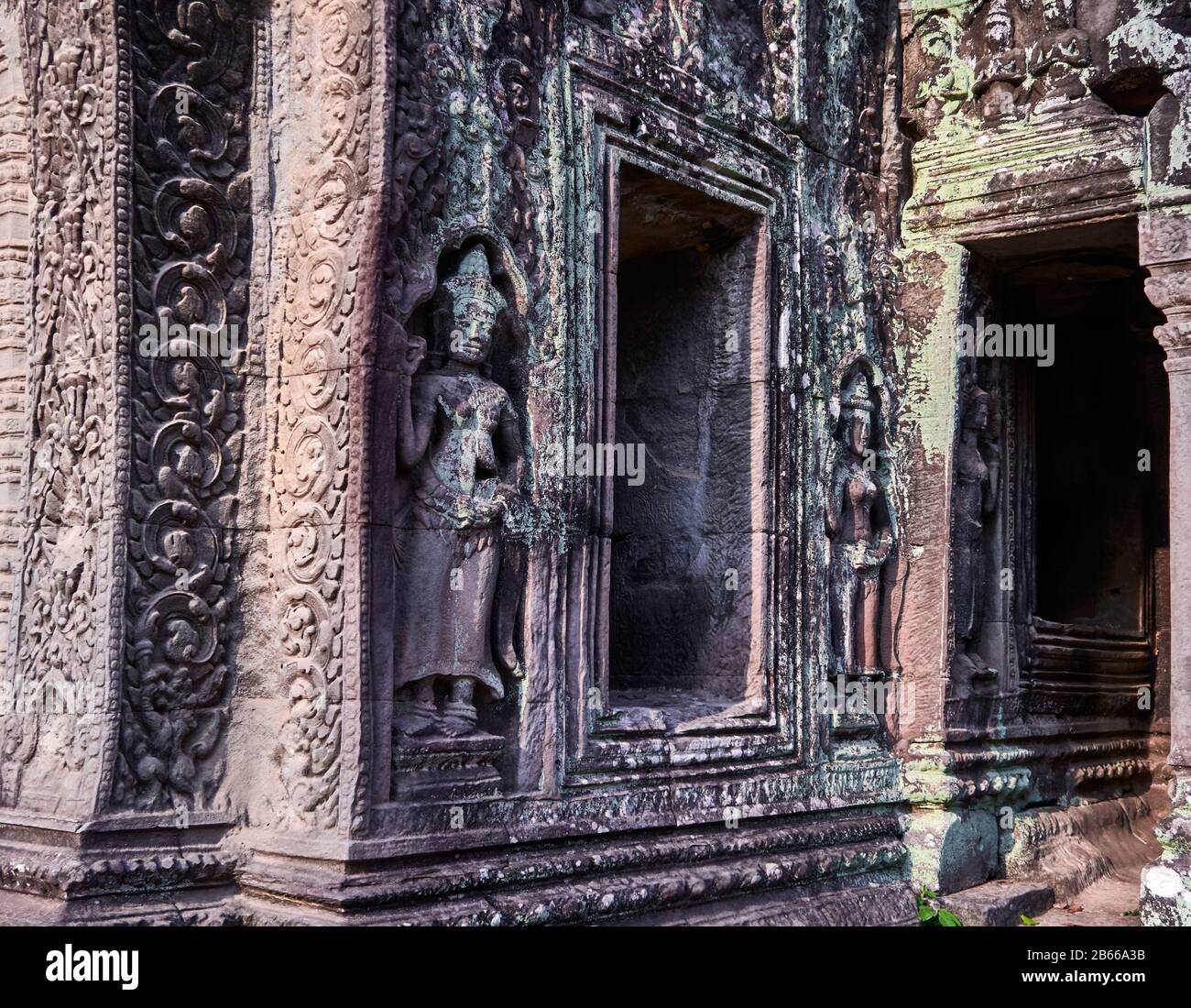 Cambodia-Angkor Ta ProhmSandstone sculpture of Apsara Devata. An Apsara or Apsarasa is a female spirit of the clouds and waters in Hindu and Buddhist mythology. Deva is the Hindu term for deity, devatas are a kind of smaller more focused devas Stock Photohttps://www.alamy.com/image-license-details/?v=1https://www.alamy.com/cambodia-angkor-ta-prohmsandstone-sculpture-of-apsara-devata-an-apsara-or-apsarasa-is-a-female-spirit-of-the-clouds-and-waters-in-hindu-and-buddhist-mythology-deva-is-the-hindu-term-for-deity-devatas-are-a-kind-of-smaller-more-focused-devas-image348034943.html
Cambodia-Angkor Ta ProhmSandstone sculpture of Apsara Devata. An Apsara or Apsarasa is a female spirit of the clouds and waters in Hindu and Buddhist mythology. Deva is the Hindu term for deity, devatas are a kind of smaller more focused devas Stock Photohttps://www.alamy.com/image-license-details/?v=1https://www.alamy.com/cambodia-angkor-ta-prohmsandstone-sculpture-of-apsara-devata-an-apsara-or-apsarasa-is-a-female-spirit-of-the-clouds-and-waters-in-hindu-and-buddhist-mythology-deva-is-the-hindu-term-for-deity-devatas-are-a-kind-of-smaller-more-focused-devas-image348034943.htmlRM2B66A3B–Cambodia-Angkor Ta ProhmSandstone sculpture of Apsara Devata. An Apsara or Apsarasa is a female spirit of the clouds and waters in Hindu and Buddhist mythology. Deva is the Hindu term for deity, devatas are a kind of smaller more focused devas
 Deva is the Hindu term for deity; devatas (Thai: thewada) are a kind of smaller more focused devas, the equivalent of guardian spirits or guardian angels. There are male and female devata. In Hinduism, the devatas that guard the nine cardinal points are called Devata Lokapala (Guardians of the Directions) or in ancient Java called Dewata Nawa Sanga (Nine guardian gods). Each caste has its guardian deva, and every human activity has its devata, its spiritual counterpart or aspect. Abandoned in the late 13th century CE, and now in ruins, Wiang Kum Kam was once the capital of Thailand’s northern Stock Photohttps://www.alamy.com/image-license-details/?v=1https://www.alamy.com/deva-is-the-hindu-term-for-deity-devatas-thai-thewada-are-a-kind-of-smaller-more-focused-devas-the-equivalent-of-guardian-spirits-or-guardian-angels-there-are-male-and-female-devata-in-hinduism-the-devatas-that-guard-the-nine-cardinal-points-are-called-devata-lokapala-guardians-of-the-directions-or-in-ancient-java-called-dewata-nawa-sanga-nine-guardian-gods-each-caste-has-its-guardian-deva-and-every-human-activity-has-its-devata-its-spiritual-counterpart-or-aspect-abandoned-in-the-late-13th-century-ce-and-now-in-ruins-wiang-kum-kam-was-once-the-capital-of-thailands-northern-image344259567.html
Deva is the Hindu term for deity; devatas (Thai: thewada) are a kind of smaller more focused devas, the equivalent of guardian spirits or guardian angels. There are male and female devata. In Hinduism, the devatas that guard the nine cardinal points are called Devata Lokapala (Guardians of the Directions) or in ancient Java called Dewata Nawa Sanga (Nine guardian gods). Each caste has its guardian deva, and every human activity has its devata, its spiritual counterpart or aspect. Abandoned in the late 13th century CE, and now in ruins, Wiang Kum Kam was once the capital of Thailand’s northern Stock Photohttps://www.alamy.com/image-license-details/?v=1https://www.alamy.com/deva-is-the-hindu-term-for-deity-devatas-thai-thewada-are-a-kind-of-smaller-more-focused-devas-the-equivalent-of-guardian-spirits-or-guardian-angels-there-are-male-and-female-devata-in-hinduism-the-devatas-that-guard-the-nine-cardinal-points-are-called-devata-lokapala-guardians-of-the-directions-or-in-ancient-java-called-dewata-nawa-sanga-nine-guardian-gods-each-caste-has-its-guardian-deva-and-every-human-activity-has-its-devata-its-spiritual-counterpart-or-aspect-abandoned-in-the-late-13th-century-ce-and-now-in-ruins-wiang-kum-kam-was-once-the-capital-of-thailands-northern-image344259567.htmlRM2B02AGF–Deva is the Hindu term for deity; devatas (Thai: thewada) are a kind of smaller more focused devas, the equivalent of guardian spirits or guardian angels. There are male and female devata. In Hinduism, the devatas that guard the nine cardinal points are called Devata Lokapala (Guardians of the Directions) or in ancient Java called Dewata Nawa Sanga (Nine guardian gods). Each caste has its guardian deva, and every human activity has its devata, its spiritual counterpart or aspect. Abandoned in the late 13th century CE, and now in ruins, Wiang Kum Kam was once the capital of Thailand’s northern
 Deva is the Hindu term for deity; devatas (Thai: thewada) are a kind of smaller more focused devas, the equivalent of guardian spirits or guardian angels. There are male and female devata. In Hinduism, the devatas that guard the nine cardinal points are called Devata Lokapala (Guardians of the Directions) or in ancient Java called Dewata Nawa Sanga (Nine guardian gods). Each caste has its guardian deva, and every human activity has its devata, its spiritual counterpart or aspect. Abandoned in the late 13th century CE, and now in ruins, Wiang Kum Kam was once the capital of Thailand’s northern Stock Photohttps://www.alamy.com/image-license-details/?v=1https://www.alamy.com/deva-is-the-hindu-term-for-deity-devatas-thai-thewada-are-a-kind-of-smaller-more-focused-devas-the-equivalent-of-guardian-spirits-or-guardian-angels-there-are-male-and-female-devata-in-hinduism-the-devatas-that-guard-the-nine-cardinal-points-are-called-devata-lokapala-guardians-of-the-directions-or-in-ancient-java-called-dewata-nawa-sanga-nine-guardian-gods-each-caste-has-its-guardian-deva-and-every-human-activity-has-its-devata-its-spiritual-counterpart-or-aspect-abandoned-in-the-late-13th-century-ce-and-now-in-ruins-wiang-kum-kam-was-once-the-capital-of-thailands-northern-image344259572.html
Deva is the Hindu term for deity; devatas (Thai: thewada) are a kind of smaller more focused devas, the equivalent of guardian spirits or guardian angels. There are male and female devata. In Hinduism, the devatas that guard the nine cardinal points are called Devata Lokapala (Guardians of the Directions) or in ancient Java called Dewata Nawa Sanga (Nine guardian gods). Each caste has its guardian deva, and every human activity has its devata, its spiritual counterpart or aspect. Abandoned in the late 13th century CE, and now in ruins, Wiang Kum Kam was once the capital of Thailand’s northern Stock Photohttps://www.alamy.com/image-license-details/?v=1https://www.alamy.com/deva-is-the-hindu-term-for-deity-devatas-thai-thewada-are-a-kind-of-smaller-more-focused-devas-the-equivalent-of-guardian-spirits-or-guardian-angels-there-are-male-and-female-devata-in-hinduism-the-devatas-that-guard-the-nine-cardinal-points-are-called-devata-lokapala-guardians-of-the-directions-or-in-ancient-java-called-dewata-nawa-sanga-nine-guardian-gods-each-caste-has-its-guardian-deva-and-every-human-activity-has-its-devata-its-spiritual-counterpart-or-aspect-abandoned-in-the-late-13th-century-ce-and-now-in-ruins-wiang-kum-kam-was-once-the-capital-of-thailands-northern-image344259572.htmlRM2B02AGM–Deva is the Hindu term for deity; devatas (Thai: thewada) are a kind of smaller more focused devas, the equivalent of guardian spirits or guardian angels. There are male and female devata. In Hinduism, the devatas that guard the nine cardinal points are called Devata Lokapala (Guardians of the Directions) or in ancient Java called Dewata Nawa Sanga (Nine guardian gods). Each caste has its guardian deva, and every human activity has its devata, its spiritual counterpart or aspect. Abandoned in the late 13th century CE, and now in ruins, Wiang Kum Kam was once the capital of Thailand’s northern
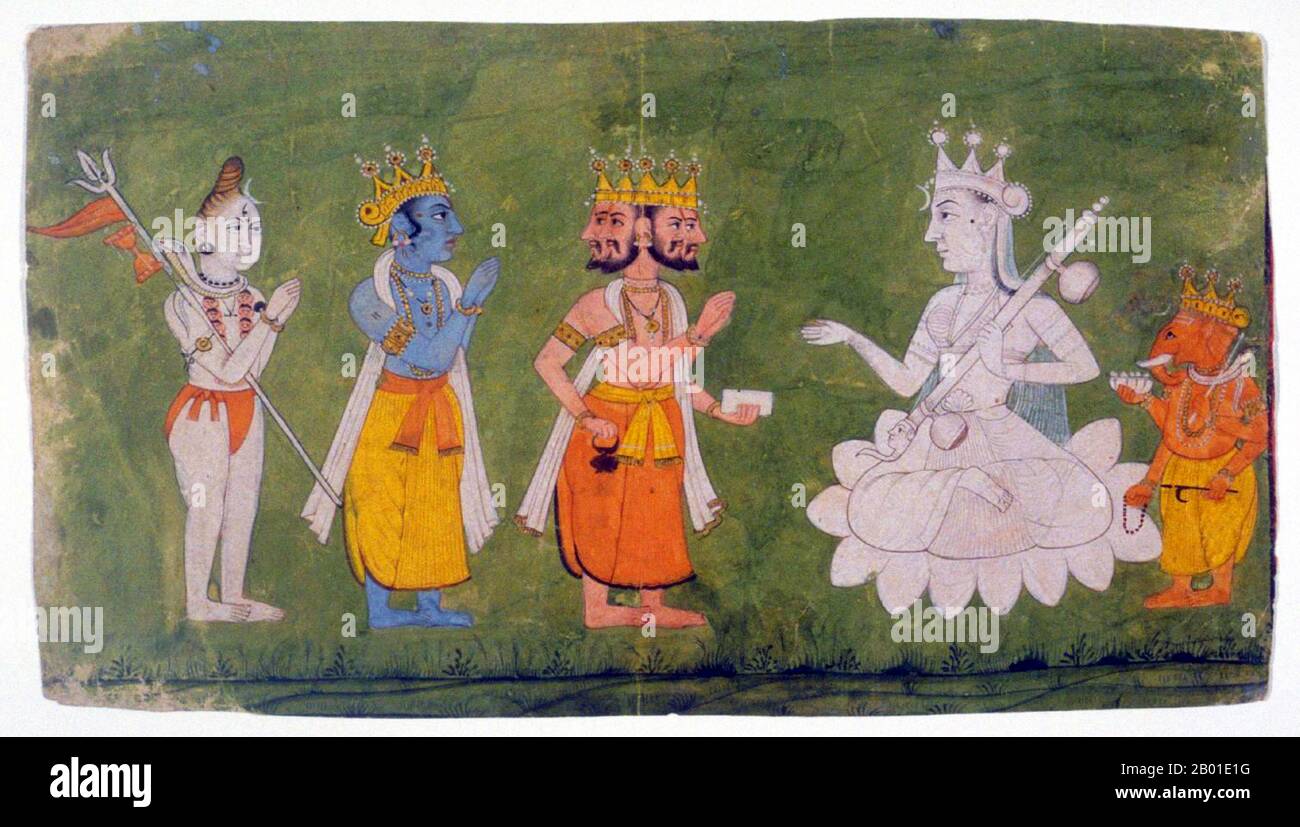 India: Shiva, Vishnu and Brahma pay homage to Mahadevi with Ganesha, c. 1750. In Hinduism, Mahadevi (Sanskrit: Mahādevī, Devanagari: महादेवी) or 'Great Goddess' is a term used to denote the Goddess or Devi that is the sum of all other Devis - an all encompassing Female Deity as the consort or complement to an all encompassing Male Deity (Deva) or the Ultimate Reality (Brahman) in Shaktism. Stock Photohttps://www.alamy.com/image-license-details/?v=1https://www.alamy.com/india-shiva-vishnu-and-brahma-pay-homage-to-mahadevi-with-ganesha-c-1750-in-hinduism-mahadevi-sanskrit-mahdev-devanagari-or-great-goddess-is-a-term-used-to-denote-the-goddess-or-devi-that-is-the-sum-of-all-other-devis-an-all-encompassing-female-deity-as-the-consort-or-complement-to-an-all-encompassing-male-deity-deva-or-the-ultimate-reality-brahman-in-shaktism-image344240332.html
India: Shiva, Vishnu and Brahma pay homage to Mahadevi with Ganesha, c. 1750. In Hinduism, Mahadevi (Sanskrit: Mahādevī, Devanagari: महादेवी) or 'Great Goddess' is a term used to denote the Goddess or Devi that is the sum of all other Devis - an all encompassing Female Deity as the consort or complement to an all encompassing Male Deity (Deva) or the Ultimate Reality (Brahman) in Shaktism. Stock Photohttps://www.alamy.com/image-license-details/?v=1https://www.alamy.com/india-shiva-vishnu-and-brahma-pay-homage-to-mahadevi-with-ganesha-c-1750-in-hinduism-mahadevi-sanskrit-mahdev-devanagari-or-great-goddess-is-a-term-used-to-denote-the-goddess-or-devi-that-is-the-sum-of-all-other-devis-an-all-encompassing-female-deity-as-the-consort-or-complement-to-an-all-encompassing-male-deity-deva-or-the-ultimate-reality-brahman-in-shaktism-image344240332.htmlRM2B01E1G–India: Shiva, Vishnu and Brahma pay homage to Mahadevi with Ganesha, c. 1750. In Hinduism, Mahadevi (Sanskrit: Mahādevī, Devanagari: महादेवी) or 'Great Goddess' is a term used to denote the Goddess or Devi that is the sum of all other Devis - an all encompassing Female Deity as the consort or complement to an all encompassing Male Deity (Deva) or the Ultimate Reality (Brahman) in Shaktism.